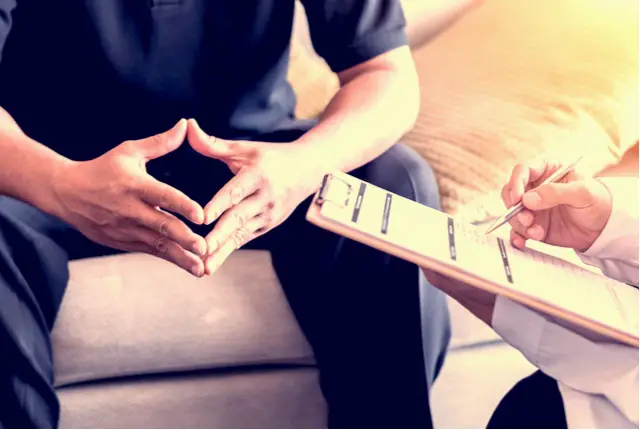(Last Updated on July 19, 2019 by Datezie Editors)
When I turned 28 and woke up with my ex-boyfriend of five years (yep, five) next to me — I knew something had to change. The on-and-off again not-quite-a-relationship wasn’t just costing me my dignity, but my chances of having a fulfilling partnership. Once I changed the sheets — scratch that — ordered new sheets, I sat down for an hour and found a therapist within my coverage network. I credit those eight months in weekly therapy, crying my way through the demons I didn’t even know I had, as the reason I was brave enough to change my life. I quit my job, I traveled for eighteen months and met a pretty spectacular human to share my life with. The experience of sorting through my thoughts, understanding my shortcomings and mental/emotional barriers made me more self-aware, built my confidence — and gave me far more guidance than any ‘relationship advice’ anyone could offer me.
But if I’m honest it was those nuggets of wisdom on the internet (and sometimes via my best friends) that led me astray sometimes. I was so outwardly focused on fulfilling a void with a person that I didn’t realize my own responsibility with mental health and dating. As cheesy as it sounds, when I met my now-boyfriend, I truly understood what it meant to be in a partnership, with two fully-functioning, mostly-happy people. Before my stint in therapy, I wasn’t able to be someone’s partner, since I wasn’t even really, my own cheerleader.
If you have seemingly tried every trick in the book to find a girlfriend or boyfriend, and you feel as if you keep striking out, it could be time to take another approach. Here, psychologists shed light on the vast importance of mental clarity as it relates to meeting a soulmate. Or in other words: why you should close out of those ‘top dating advice’ articles — and perhaps, seek your own experts:
Our mental health impacts everything.
If you asked psychologist specializing in online couples therapy, Dr. Sarah Schewitz, our mental state isn’t just important in dating — but in every aspect of our life. “Our mental state impacts the way we think and feel which impacts the way we act and the way we experience life,” she explains. If you are depressed, you are more likely to have a negative mindset about dating and will be less motivated to put yourself out there to meet new people. And if you are anxious, you might become more clingy when dating and/or give off a vibe of lacking confidence which can sometimes be a turn off, she adds. This energy doesn’t depict who you are — and it could send the wrong message to a could-be partner.
Your mental health could sabotage every date.
You dressed to impress, you researched a bar before picking it and you even showed up early. And yet — yet! — you leave the date feeling defeated and discouraged. Without realizing it, you could be sabotaging every conversation and encounter because your judgement is off. As licensed professional counsellor specializing in relationships Crystal Bradshaw says, often times when your mental state is meh, you aren’t able to show your best self, recognize red flags you would normally avoid, or see opportunities to improve your interpersonal skills. You might over index on ‘needy’ because well, you do feel a little desperate. “If someone is feeling overwhelmed about dating, hopeless about finding someone, worried that no one will be interested in them, they may find themselves attracted to people who are not available or not interested in them, thus reinforcing the cognitive distortion,” she explains. “If your self-esteem is down in the dumps and you think no one could possibly have any interest in you, then that’s the energy you’re putting out into the world and people pick up on that. You’ll end up chasing people away or draw the wrong kind of person to you.”
If you feel hopeless, it’s time to make a change.
By the time I walked into my therapist’s office, I couldn’t make it through five minutes talking about the parade of dates I’d been on without choking back tears. I spent the first few sessions trying to form sentences through crying fits — but by the third one, I was starting to feel lighter. And less hopeless about my ‘single situation.’ Bradshaw says one of the greatest indicators that therapy could be a solid option. “Feeling like there is no one out there for you. Feeling like you aren’t worthy of a relationship. Feeling like there’s something wrong with you. Feeling like it’s you and everyone else is thriving. If you have been hurt in the past and it’s hindering your present. All of these are indicators that psychodynamic therapy is appropriate for you,” she explains.
If your self-esteem is down in the dumps and you think no one could possibly have any interest in you, then that’s the energy you’re putting out into the world and people pick up on that. You’ll end up chasing people away or draw the wrong kind of person to you
If you keep dating the same kind of person, therapy helps, too.
If you Google how to get over someone, you’ll be met with a landslide of advice from burning their things to creating a vision board for what you want — and the list goes on. But the hard fact is even if you technically broke up with your ex years ago — you may be dating versions of her or him, without knowing. Schewitz says plenty of singles are guilty of this (terrible) habit — and yet, this routine could be the most important one to break. “If you keep dating the same type of person over and over again with negative results, that’s a great indicator it’s time to seek therapy,” she continues. “When we are repeatedly attracted to partners who aren’t good for us, it’s often a sign that there is a worthiness wound from childhood that has you unconsciously believing you don’t deserve better.”
When you work with a therapist, you’ll go over why you’re attracted to this type of person and better articulate how to nix the issue. More often than not, it will push you out of your comfort zone so you can really focus on what will make a meaningful difference in your dating life — and what will waste your energy and heart. “Therapy can help you identify this interplay and help you learn to distinguish between attraction to something that is familiar but not good and attraction to a true connection. Therapy can help you learn how to recognize when someone is actually interested in you, cares for you, and loves you,” Bradshaw shares. “Sometimes these people are around, but get overlooked because it doesn’t feel familiar. Instead it feels boring, uninteresting or the differences seem too great to overcome. Therapy can challenge your reality on this by presenting different perspectives that are not purely egocentric.”
Therapy can improve your self-worth.
If you would have asked me three years ago to rate my confidence, I probably would have shouted from the rooftops. But even if I could put on a show with only feel-good vibes, in reality, I was struggling to keep a smile painted on my face. Bradshaw says one of the mega benefits of therapy is having the opportunity (and the safe space) to do the important self-work needed to identify positive coping skills. “When you work with a therapist, you’re working with someone who is unbiased and will be able to see patterns you may not be able to recognize on your own. They can offer feedback and suggestions, as well as provide a space to process things as they arise so you can explore more deeply what’s going on for you,” she explains.
Therapy can make you want crystal-clear.
You may believe you know what you want — but when you get to the nitty-gritty details of what you actually need in a relationship, you may be at a lost. Though you can find plenty of wisdom circulating the net, all promising to guide your list of ‘must haves’, it’s soul work that’ll actually reveal what you need. “Therapy can help you identify what your values are, what you want in a partner, what your deal breakers are, and how you might be getting in your own way,” Bradshaw explains. Maybe someone who also lost a parent would be important for you to have in common, or someone who has patience when you don’t. Whatever the case — big or small — talking through what matters to you with a professional can reveal blind spots.
Therapy can help you love yourself.
Yeah, you may be cringing at the phrase since it’s throw around so often. But there’s a reason so many experts, coaches, therapists and your happily married friends urge prioritizing self-love over romantic love. Therapy (and travel) cemented my inner strength and allowed me to celebrate the parts of me that were stellar — while not beating myself up for the areas I was lacking. By the time I swiped right on my boyfriend (on Tinder, of all places) — I didn’t need validation from him. More so, he complimented my weaknesses, as I did the same for him. “Before you can ask someone to love you, you must first love yourself. If you are struggling in that department then you are going to have a hard time dating. This is when therapy is key,” Bradshaw explains. “To have a real, deep, meaningful connection with someone there has to be intimacy, but intimacy cannot happen if you don’t know yourself. You have to know, and accept, who you are as an individual before you can let someone see who you are. You also have to be able to see the other person.”





